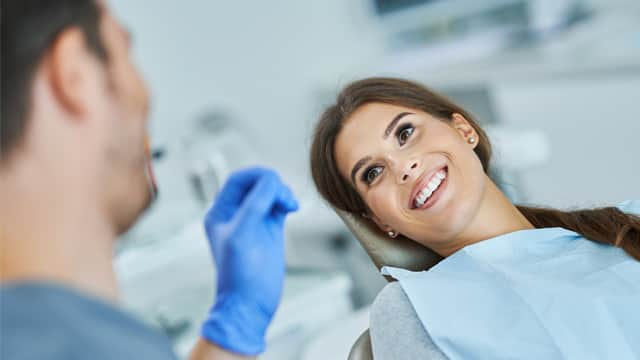-
-

FLUORIDE
What Is Stannous Fluoride Toothpaste?Discover what is Stannous Fluoride Toothpaste and its importance to prevent cavities and other oral health problems.

TEETH WHITENING
Whitening toothpaste - hydrogen peroxide vs. carbamide peroxideIf you lose one or more of your front teeth due to injury or decay, you may feel ...
-
Science & InnovationOral Health Commitment
- Oral Health Commitment
- Bright Smiles, Bright Futures
- Educational Resources
- Mobile Dental Van
- Volunteer
- ORAL HEALTH CHECK
- PRODUCT MATCH
- Oral Health and Dental Care | Colgate®
- Oral Health
- What Is Dentinogenesis Imperfecta?


Have you noticed your teeth becoming translucent or discolored? You might be showing signs of dentinogenesis imperfecta. Dentinogenesis imperfecta (DI) is a rare genetic disorder that affects the dentin of your teeth. Recognizing the signs and symptoms and consulting your dental professional will help you understand this uncommon dental condition.
What Is Dentinogenesis Imperfecta?
DI is a dental abnormality traced back to a mutation in the DSPP gene, which provides tooth development instructions. According to the Genetic and Rare Diseases Information Center, the DSPP gene writes the blueprint for proteins to form dentin, the second layer of tooth structure located under your enamel. When the DSPP gene is mutated, the dentin does not form correctly, which results in an abnormally soft middle layer of the tooth.
DI causes teeth to appear translucent or discolored, showing gray-blue or yellow-brown undertones. This condition affects both the primary (baby) and permanent (adult) teeth. In addition to changing your teeth's appearance, DI can make the teeth weaker than usual and, therefore, more prone to damage, fractures, wear, and tooth loss.
3 Types of Dentinogenesis Imperfecta
There are three types of DI:
- Type I DI occurs in people who also have osteogenesis imperfecta. This condition is similar in genetic origin but causes brittle bones.
- Type II DI occurs in people without another hereditary disorder and affects primary more than permanent teeth. This may occur in people who exhibit signs of age-related hearing loss or deafness. Type II is the most common type of dentinogenesis imperfecta.
- According to the National Organization for Rare Disorders, type III DI occurs in people without another hereditary disorder and seems to be isolated to a group of individuals in southern Maryland.
Dentinogenesis Imperfecta Treatment
If you think you show symptoms of DI, contact your dental provider for a complete assessment. Dentinogenesis imperfecta treatment is generally focused first on the patient's primary teeth. It includes restorative procedures, such as crowns or preventive fillings, to strengthen brittle teeth. Later in life, your dental professional may recommend dental implants or dentures as tooth replacement becomes necessary.
Under a doctor's guidance, it is possible to test for a genetic link to DI and obtain an accurate diagnosis. Your dental professional can refer you to a specialized provider. Together, they can help you address your specific dental needs.
Dentinogenesis imperfecta can cause you to lose confidence in your smile. However, with a close analysis of your symptoms and help from your dental professional, you can get the treatment you need and get your smile back on track.
Oral Care Center articles are reviewed by an oral health medical professional. This information is for educational purposes only. This content is not intended to be a substitute for professional medical advice, diagnosis or treatment. Always seek the advice of your dentist, physician or other qualified healthcare provider.
Related Articles

Developmental disabilities
What Is Oromandibular Dystonia (OMD)?You may not have heard of oromandibular dystonia before, perhaps because it's a very rare condition. Learn more about it.

Developmental disabilities
What's an Enamel Pearl? Causes, Diagnosis, and TreatmentAn enamel pearl is a developmental defect that results in a nodule of enamel developing on the root of a tooth — where it doesn't belong! Learn more here.

Developmental disabilities
How Cleidocranial Dysplasia Affects The TeethCleidocranial dysplasia is an extremely rare genetic condition that involves a number of distinctive features, including dental abnormalities. Here's more.

Developmental disabilities
How To Identify And Treat A Lip TieLip tie occurs when the soft tissue that attaches the upper lip to the upper gum interferes with breastfeeding. Learn how to spot and treat lip tie.
Related Products

Colgate Total Active Prevention Whitening Toothbrush is a soft toothbrush with charcoal infused spiral and Floss-Tip bristles (1). This soft bristle toothbrush fights the root cause* of cavities, plaque, gingivitis, bad breath, tartar buildup**, and stains*** and also helps remove surface stains to prevent stain buildup.

Power away plaque with Colgate Total Battery Powered Toothbrush. This battery operated toothbrush for adults fights the root cause* of cavities, plaque, gingivitis, bad breath, tartar buildup**, and stains***. Plus, this battery toothbrush has a built in 2 minute timer and features two cleaning modes, Sensitive and Regular, to cater to your unique oral care needs.

The Colgate Total® Active Prevention Foaming Clean Soft Bristle Toothbrush is specially designed to tackle the root cause* of cavities, plaque, gingivitis, bad breath, tartar buildup**, and stains***.

Colgate Total Alcohol Free* Gum Health Mouthwash delivers 24-hour protection** against bacteria and also helps prevent gum problems

Helping dental professionals
More professionals across the world trust Colgate. Find resources, products, and information to give your patients a healthier future




